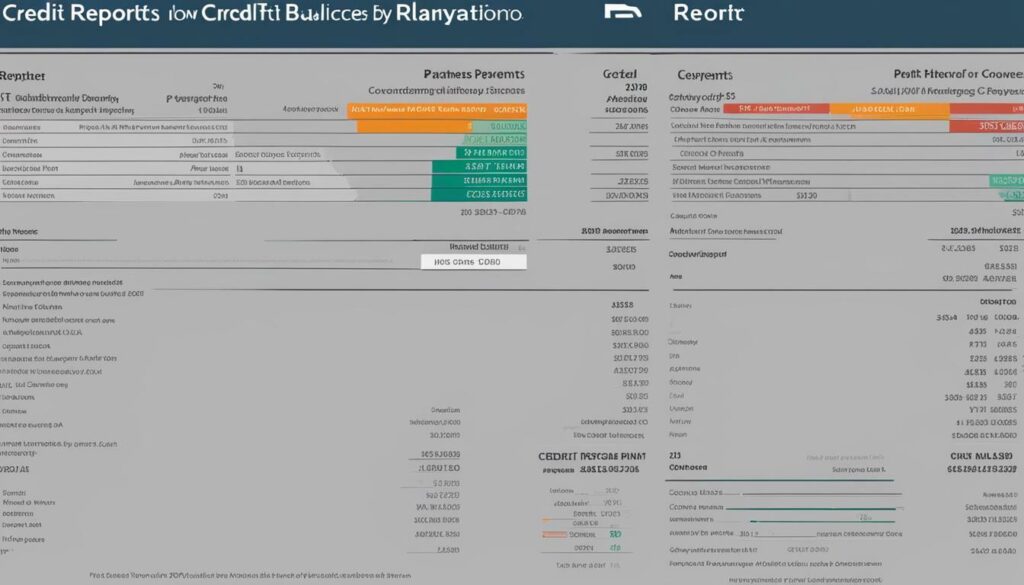Mastering Credit Reporting Etiquette for Couples: A Guide

Understanding credit reporting etiquette is crucial for couples who want to manage their finances effectively. When it comes to credit reports for married couples, it’s important to navigate the rules and guidelines together to ensure a smooth financial journey.
Credit reports play a significant role in financial decision-making for couples. They provide a comprehensive view of your credit history, including credit card balances, loan payments, and any outstanding debts. Regularly reviewing your credit reports as a couple allows you to identify any errors or discrepancies and take necessary steps to correct them.
Managing credit responsibly as a couple is key to maintaining a healthy financial relationship. Paying credit card bills on time and in full, keeping credit card balances low, and avoiding unnecessary debt are all essential practices. By following these credit reporting tips, you can build a solid credit history together.
Building credit as a couple involves joint efforts. Becoming authorized users on each other’s credit cards and taking out joint loans are effective ways to establish credit together. It’s important to remember that both partners’ credit histories can impact your joint financial goals, so working together and communicating openly is vital.
Protecting against credit fraud is paramount in today’s digital age. Freezing your credit can provide an additional layer of security and prevent unauthorized access to your credit information. By understanding the credit reporting guidelines and learning how to freeze and unfreeze credit as a preventive measure, you can safeguard your financial well-being.
🚨 TUIC Errors + Low Credit Score?
CreditScoreIQ helps you build credit faster by reporting utility bills to all 3 bureaus—while you dispute errors.
Start Building Credit Today →Understanding credit bureaus and credit scores is also crucial for couples. Different credit bureaus may have varying credit scores, so it’s important to be aware of this when reviewing your reports. Additionally, there are common mistakes that couples should avoid, such as closing old accounts or applying for multiple new credit cards simultaneously, as they can negatively impact your credit scores.
- Understanding credit reporting etiquette is crucial for couples managing their finances effectively.
- Regularly review credit reports and address any errors or discrepancies.
- Manage credit responsibly by paying bills on time, keeping balances low, and avoiding unnecessary debt.
- Build credit together through authorized user status and joint loans.
- Protect against credit fraud by learning how to freeze and unfreeze credit.
- Be aware of credit bureau variations and avoid common mistakes that can impact credit scores.
The Role of Credit Reports for Couples
Credit reports are comprehensive records of an individual’s credit history that provide crucial information for couples to make informed financial decisions. These reports contain details about your credit accounts, payment history, outstanding debts, and other important factors that lenders consider when evaluating your creditworthiness. For married couples, understanding each other’s credit reports is essential for managing joint finances and achieving common financial goals.
When you review your credit reports together, you gain insight into your partner’s financial habits, debt obligations, and potential red flags that may affect future financial endeavors. This knowledge allows you to have open and honest discussions about your financial situation, enabling you to align your goals and make responsible decisions as a couple.
By regularly monitoring your credit reports, you can identify any errors or discrepancies that might negatively impact your credit score. These errors could be as simple as a misspelled name or as significant as an incorrect account status. Addressing these issues promptly can help you maintain a healthy credit profile and avoid potential hurdles when applying for loans or other credit products as a couple.
| Benefits of Understanding Credit Reports | How It Helps Couples |
|---|---|
| Identify potential errors and discrepancies | Prevents credit issues from affecting joint financial endeavors |
| Monitor individual credit habits and debt obligations | Facilitates open and honest discussions about finances |
| Spot potential red flags and address them promptly | Helps maintain a healthy credit profile |
The Importance of Reviewing Credit Reports Regularly
It is crucial for couples to review their credit reports regularly, ideally at least once a year. By doing so, you can proactively manage your credit and ensure that any inaccuracies or fraudulent activities are addressed promptly.
“Reviewing your credit reports as a couple allows you to stay on top of your financial health and take necessary actions to protect your credit.”
Remember, financial compatibility is an essential aspect of any successful relationship. By understanding and managing your credit reports together, you can strengthen your financial foundation and pave the way for a brighter financial future as a couple.

Managing credit responsibly as a couple requires adhering to certain dos and don’ts to maintain a healthy credit profile. By following these credit reporting tips for couples, you can build a solid financial foundation and ensure a smooth financial journey together.
“The strength of your credit report is crucial when applying for loans or mortgages. It can affect your eligibility and interest rates.”
- Do: Pay your credit card bills on time and in full. Late or missed payments can negatively impact your credit scores and make it harder to qualify for loans or credit in the future.
- Do: Keep your credit card balances low. High credit card utilization can lower your credit scores, so aim to keep your balances below 30% of your available credit limit.
- Do: Establish a joint budget and communicate openly about your financial goals. By working together, you can avoid unnecessary debt and make informed decisions about your credit usage.
- Do: Regularly review your credit reports together. This will allow you to identify any errors or discrepancies and address them promptly.
Now let’s take a look at some important don’ts:
- Don’t: Apply for multiple new credit cards simultaneously. Each credit card application generates a hard inquiry on your credit report, which can temporarily lower your credit scores.
- Don’t: Close old credit card accounts. Length of credit history is a factor in determining your credit scores, so keeping your oldest accounts open can increase the average age of your credit.
- Don’t: Max out your credit cards. Using up all of your available credit can signal to lenders that you may be financially stretched and increase the risk of default.
By following these credit reporting dos and don’ts for couples, you can establish a strong financial foundation, build credit together, and achieve your financial goals. Remember, communication and collaboration are key when it comes to managing your credit as a couple.
| Do | Don’t |
|---|---|
| Pay your credit card bills on time and in full | Apply for multiple new credit cards simultaneously |
| Keep your credit card balances low | Close old credit card accounts |
| Establish a joint budget and communicate openly | Max out your credit cards |
| Regularly review your credit reports together |
Image:

Building Credit Together
Building credit together as a couple is a critical step in achieving your shared financial goals. By establishing and maintaining good credit, you not only increase your chances of obtaining favorable loan terms in the future but also open doors to potential opportunities such as purchasing a home or starting a business. Here are some tips and best practices to help you manage credit as a couple and build a strong credit history together.
To start, it is important for both partners to have individual credit cards in their own names. This allows each person to build their own credit history and demonstrates financial responsibility. Additionally, having separate accounts can provide a sense of financial independence and minimize the risk of one person negatively impacting the other’s credit.
However, it’s equally important to have joint accounts as well. Joint accounts can strengthen your credit history as a couple and demonstrate your ability to manage shared financial responsibilities. You can consider opening a joint credit card or taking out a joint loan, such as a mortgage or a car loan, to build credit together. Remember, though, that with joint accounts, both partners are equally responsible for making payments on time and in full.
Another effective strategy is to become authorized users on each other’s credit cards. This allows both partners to benefit from the positive payment history and responsible credit usage of the primary cardholder. However, it’s crucial to communicate and set clear boundaries regarding spending limits and financial goals to ensure responsible credit usage.

When managing credit as a couple, it’s important to follow some dos and don’ts to maintain a healthy credit profile:
- Do pay your bills on time: Late payments can negatively impact both partners’ credit scores. Make it a priority to pay your credit card bills, loans, and other financial obligations on time.
- Don’t max out your credit cards: Keeping your credit card balances low demonstrates responsible credit usage and can improve your credit score. Aim to keep your credit utilization ratio below 30%.
- Do communicate openly about financial goals: Regularly discuss your financial goals and make joint decisions about credit utilization, spending, and debt management.
- Don’t apply for multiple credit cards simultaneously: Applying for multiple credit cards within a short period of time can negatively impact your credit score. Only apply for credit when you truly need it.
- Do review your credit reports regularly: Regularly checking your credit reports together allows you to identify any errors or discrepancies and take appropriate action to correct them.
| Credit Reporting Tips for Couples | Best Practices |
|---|---|
| Pay bills on time | Set up automatic payments or reminders to ensure timely payments. |
| Monitor credit utilization | Avoid maxing out your credit cards and keep balances low. |
| Communicate openly | Discuss financial goals, spending limits, and debt management strategies together. |
| Regularly review credit reports | Check your credit reports together to identify any errors or discrepancies. |
By following these credit reporting tips for couples and implementing best practices, you can work together to build a strong credit history and achieve your financial goals. Remember, credit-building is a journey that requires consistent effort and communication. Stay proactive, stay informed, and enjoy the benefits of a solid credit foundation.
Protecting Against Credit Fraud
Protecting against credit fraud is essential for couples, and freezing your credit can provide an extra layer of security. By freezing your credit, you can prevent unauthorized individuals from opening new accounts or accessing your credit information. This is particularly important for couples, as joint accounts and shared finances can make them more vulnerable to identity theft.
To freeze your credit, follow these steps:
- Contact each of the three major credit bureaus: Equifax, Experian, and TransUnion. Inform them that you want to freeze your credit.
- Provide the necessary information, including your personal details and social security number, to verify your identity.
- Once your credit is frozen, you will receive a unique PIN or password for each credit bureau. Keep these in a safe place, as you will need them to unfreeze your credit in the future.
To unfreeze your credit when needed, simply contact the credit bureaus again and provide your PIN or password. This allows you to temporarily lift the freeze, enabling you to apply for credit or make other necessary financial transactions. Remember to refreeze your credit afterward to maintain protection against fraud.
| Credit Bureau | Website | Phone Number |
|---|---|---|
| Equifax | equifax.com | 1-800-349-9960 |
| Experian | experian.com | 1-888-397-3742 |
| TransUnion | transunion.com | 1-888-909-8872 |
Freezing your credit is a simple yet effective way to protect yourself and your partner from credit fraud. By taking this proactive step, you can have peace of mind knowing that your credit information is secure. Remember to review your credit reports regularly and monitor your financial accounts for any suspicious activity. By staying vigilant, you can ensure that your credit remains in good standing and avoid any unnecessary financial stress.

Understanding credit bureaus and credit scores is crucial for couples seeking to maintain and improve their creditworthiness. Credit bureaus play a significant role in determining individuals’ creditworthiness by collecting and maintaining credit information. There are three major credit bureaus in the United States: Equifax, Experian, and TransUnion. These bureaus gather data from various sources, such as lenders, financial institutions, and public records, to generate credit reports.
Credit scores, on the other hand, are numerical representations of an individual’s creditworthiness based on the information found in their credit reports. Different credit bureaus may use slightly different scoring models, which can result in variations in credit scores. However, generally, credit scores range from 300 to 850, with a higher score indicating better creditworthiness.
When it comes to maintaining and improving credit as a couple, it is essential to monitor credit reports and scores regularly. By reviewing credit reports, couples can identify any errors or discrepancies that may affect their creditworthiness. It is recommended to check each bureau’s credit report at least once a year to ensure accuracy.
Additionally, couples should be aware of the factors that influence credit scores and take appropriate actions to improve them. Payment history, credit utilization, length of credit history, and types of credit used are among the key factors that determine credit scores. Couples can work together to pay bills on time, keep credit card balances low, and diversify their credit portfolio to positively impact their credit scores.
By understanding credit bureaus and credit scores, couples can make informed decisions about their finances and strive to maintain a healthy credit profile. Monitoring credit reports, identifying errors, and actively working towards improving credit scores will pave the way for a secure financial future together.
| Factors Affecting Credit Scores |
|---|
| Payment History |
| Credit Utilization |
| Length of Credit History |
| Types of Credit Used |

Conclusion
Mastering credit reporting etiquette as a couple is an ongoing process that requires open communication, shared goals, and a commitment to financial responsibility. By understanding the importance of credit reports and how they impact your joint financial journey, you can make informed decisions and avoid common pitfalls.
One of the key aspects of credit reporting etiquette for couples is managing credit responsibly. This includes paying your credit card bills on time and in full, keeping your credit card balances low, and avoiding unnecessary debt. By practicing these credit reporting dos and don’ts, you can maintain a positive credit history and increase your chances of achieving your financial goals together.
Building credit together is another essential aspect of managing credit as a couple. Becoming authorized users on each other’s credit cards and taking out joint loans are effective strategies to establish credit and strengthen your financial foundation as a partnership. By working together to build your credit, you can access better interest rates and loan terms, enabling you to achieve your shared dreams.
It’s also crucial to protect against credit fraud. Freezing your credit is a preventive measure that adds an extra layer of security to your financial well-being. By following the provided step-by-step instructions to freeze and unfreeze your credit, you can safeguard your credit profile and prevent unauthorized access to your personal information.
In addition, understanding the role of credit bureaus and how credit scores can vary among them is vital for couples. Avoid common mistakes, such as closing old accounts or applying for multiple new credit cards simultaneously, which can negatively impact your credit scores. By staying informed and practicing good credit reporting etiquette, you can maintain healthy credit scores and enhance your financial stability.
In conclusion, mastering credit reporting etiquette as a couple is essential for your financial success. By following the discussed guidelines, communicating openly, and collaborating on your financial decisions, you can navigate your credit journey with confidence. Remember, credit reporting etiquette for couples is an ongoing commitment, and by prioritizing financial responsibility, you can achieve your shared dreams and build a prosperous future together.
FAQ
Q: What is credit reporting etiquette for couples?
A: Credit reporting etiquette for couples refers to the responsible management of credit as a couple. It includes practices such as paying credit card bills on time, keeping balances low, and understanding how credit works as a joint financial responsibility.
Q: Why is it important for couples to understand credit reports?
A: Understanding credit reports is important for couples because it allows them to make informed financial decisions together. It helps both partners have visibility into their credit histories, identify any errors or discrepancies, and work towards improving their credit scores.
Q: How can couples manage credit responsibly?
A: Couples can manage credit responsibly by paying credit card bills on time and in full, keeping credit card balances low, and avoiding unnecessary debt. Regularly reviewing credit reports and discussing financial goals together can also contribute to responsible credit management.
Q: What are some strategies for building credit together?
A: Couples can build credit together by becoming authorized users on each other’s credit cards, taking out joint loans, and ensuring that both partners’ credit histories are reported and recognized. It is important to use credit responsibly and establish a solid credit history as a couple.
Q: How can couples protect against credit fraud?
A: Couples can protect against credit fraud by freezing their credit. Freezing credit prevents unauthorized individuals from accessing credit in the couple’s name. The guide provides step-by-step instructions on how to freeze and unfreeze credit to protect against potential fraud.
Q: What is the role of credit bureaus and how do credit scores vary among them?
A: Credit bureaus collect and maintain credit information on individuals. Credit scores, which indicate creditworthiness, can vary among credit bureaus based on the data they have on file. It is important for couples to understand this variation and monitor their credit scores from different bureaus.
Ready to Improve Your Credit?
Disputing TUIC errors is step one. Step two? Boost your score by reporting utility payments with CreditScoreIQ.
Get Started Now (Only $1 Trial) →3-bureau reporting • $1M identity insurance • Dark web monitoring






